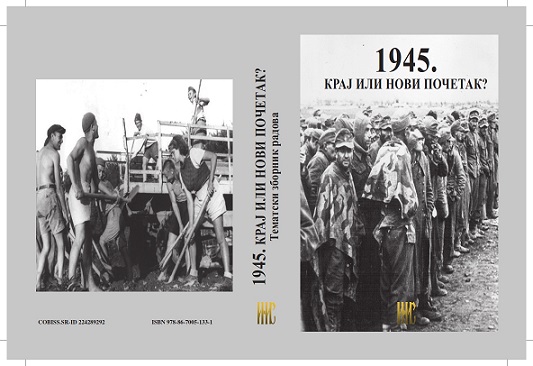Албанско становништво у процесу изградње „народне власти“ нa Косову и Метохији 1945.
The Albanian Population during the Formation of the “People’s Government” in Kosovo and Metohija 1945
Author(s): Dušan Bojković
Subject(s): Civil Society, Political history, Government/Political systems, WW II and following years (1940 - 1949), History of Communism, Inter-Ethnic Relations, Sociology of Politics
Published by: Institut za noviju istoriju Srbije
Keywords: Albanians; Serbs; Montenegrins; Kosovo and Metohija; Serbia; Communist Party of Yugoslavia; Ballists; Military Government; agrarian reform; colonists; Brotherhood and Unity;
Summary/Abstract: After liberation of Kosovo and Metohija in November 1944 the bulk of the Albanian population greeted the Yugoslav Army with mistrust, refusing at the same time to cooperate with the new Yugoslav authorities. Mass armed rebellion in the winter of 1944/45 organized by Albanian collaborationists and German secret services had an anti-Yugoslav, anti-Serbian and separatist character. The national policy of the Communist Party of Yugoslavia in the territory of Kosovo and Metohija was implemented with the aim of deescalating ethnic tensions between the Serbs and the Albanians. Establishing cooperation between the new authorities and the broader masses of Albanian population was seen as crucial for the integration of the Albanians into the Yugoslav community and establishing a durable peace in that region. Political emancipation of the Albanian national minority foresaw securing rights of its representatives to participate in the government. Policy of selecting cadres was harmonized with the ethnic make-up of the Autonomous Kosovo-Metohija Region. Cultural emancipation of the Albanians was pursued through literacy courses, setting up of minority schools, launching journals in Albanian etc. Foreign political orientation of Yugoslavia that was, among other things, aimed at developing friendly relations with Albania, tended to downplay the scale of Kosovo-Albanians’ collaboration with the occupiers during the war 1941-1944 and the responsibility for crimes against Serbian civilians.
Book: 1945. Kpaj или нови почетак?
- Page Range: 107-139
- Page Count: 33
- Publication Year: 2016
- Language: Serbian
- Content File-PDF

